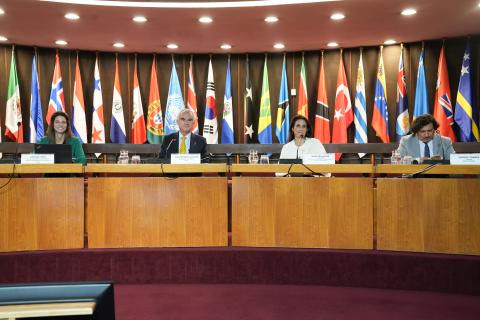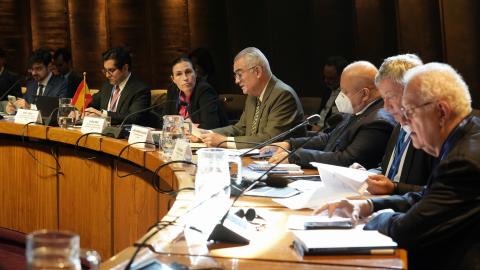Press Release
The Executive Secretary of the Economic Commission for Latin America and the Caribbean (ECLAC), Alicia Bárcena, reaffirmed the importance of strengthening public revenue to have greater capacity to mobilize the domestic resources that allow for financing the fulfillment of the 2030 Agenda’s Sustainable Development Goals (SDGs) and the region’s development needs, during the presentation of the report Fiscal Panorama of Latin America and the Caribbean 2019 that took place this Thursday, June 27, at the Center for Global Development, in Washington, D.C.
The United Nations regional organization’s most senior representative proposed bolstering fiscal space by strengthening tax revenue, which would require reducing the high level of tax evasion and avoidance (which was equivalent to 6.3% of Gross Domestic Product in 2017, or $335 billion dollars); making tax collection more progressive; and exploring other revenue sources, such as taxes on the digital economy, environmental taxes and those aimed at improving public health. She offered these reflections at an event entitled Fiscal Challenges in Latin America: Policy Measures for Sustainable & Inclusive Growth, which drew the participation of well-known experts from the Center for Global Development, the World Bank, the International Monetary Fund (IMF) and the Inter-American Development Bank (IDB).
The members of the panel discussion included Sanjeev Gupta and Nancy Birdsall, from the Center for Global Development; Marcello Estevão, Global Director of Macroeconomics, Trade and Investment at the World Bank; Eric Parrado, Chief Economist and General Manager of the IDB’s Research Department; and Jorge Roldos, Assistant Director of the IMF’s Western Hemisphere Department.
Alicia Bárcena presented a series of recommendations to broaden countries’ fiscal space, promote public spending and investment, and strengthen multilateral and regional relations to close policy asymmetries.
In her presentation, Bárcena noted that in order to broaden fiscal space, tax evasion must be reduced along with illicit financial flows stemming from the manipulation of international trade in goods – which reached $85 billion dollars in 2016, or 1.5% of regional GDP; environmental and health taxes must be adopted, along with levies on the digital economy; tax expenditures must be rethought to align them with investment results; and the taxation of personal income and property must be strengthened.
In the area of public spending and investment, ECLAC’s Executive Secretary said that people’s dual inclusion (social and labor) must be protected on the basis of social spending; public investment should be oriented towards innovative technologies based on natural resources; public-private agreements should be fostered to boost infrastructure and renewable energy; and fiscal incentives for industrial policies must be redesigned.
In the regional and multilateral sphere, Bárcena indicated that it is necessary to forge regional and global agreements to reduce evasion, avoidance and illicit flows; to reduce harmful tax competition; to review and align tax incentives with investment; and to reduce global asymmetries while also strengthening dialogue with transnational companies.
“One of the major problems of Latin America and the Caribbean is evasion: 335 billion dollars. That is a lot of money! We must strengthen fiscal space by bolstering tax revenue,” she stressed.
“The region’s debt has increased despite fiscal consolidation efforts. If you think that Latin America and the Caribbean is made up of middle income countries that should be 'graduated' (from official development aid), that is not true. We still have many gaps to fill,” she warned.
While recognizing that the region’s inequality figures improved between 2002 and 2014 thanks to the implementation of public policies and tax reforms, Bárcena emphasized that it is necessary to pay attention as well to the evolution of personal income and wealth. “For example, there is a tenfold difference in salaries between the northern triangle of Central America and the United States. Tenfold! In addition, the income of the 10% of people with the greatest resources in Central America is 70 times higher than the income of the 10% with the fewest resources. How, then, can anyone tell the people in these countries not to migrate? How do you deal with that?” she said.
In this context, Alicia Bárcena called on the main multilateral organizations that operate in Latin America and the Caribbean (such as the IMF, the World Bank, the IDB and ECLAC) to have a big debate about these figures and work together to present these problems at the highest political level.
In the framework of her visit to Washington, ECLAC’s Executive Secretary also attended on this Thursday, June 27, a meeting of the Board of Directors of the Inter-American Dialogue, in which Bárcena participates along with prominent figures such as the former Presidents of Brazil, Chile, Costa Rica, Mexico and Panama (Fernando Henrique Cardoso, Ricardo Lagos, Laura Chinchilla, Ernesto Zedillo and Martín Torrijos, respectively), among others.



